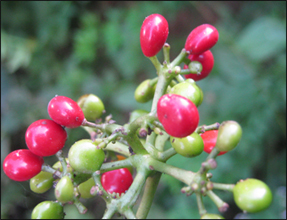Patha, Abuta (Cissampelos Pareira)

Patha is selender climbing shrub with pubescent branches. Leaves of this herb are peltate about 12cm long. Yellow colored flowers of this plant are very small. Flower contains four hairy, obovate and oblong sepals. Peduncle of male flowers is 18mm long and arranged in axillary cymes. Female flowers of this herb are solitary or twin, elongate and axillary racemes. Length of filaments is longer than corolla. Fruits are drupe, 6mm long and 4mm broad. Fresh Fruits are compressed, hairy-pubescent, subglobose, red colored, transversely ridged, endocarp and turn black after ripening. Fruit contains seeds that are like horse shoe in shape.
General Description
Abuta, ice vine, false pareira and velvet leaf all are common names of patha. This herb is commonly found in orchards, parks and gardens. In ayurvedic medicinal system this herb is used for its antispasmodic action. Achayra shushrut used this herb for the cleansing and healing of wounds and ulcers. Acharya charka used this herb to treat various ailments associated with female reproductive system. According to rajnighantu this herb is "bhagna sandhankrit"- used in fracture healing. Patha is slender and tropical woody herb that resembles a ruffled ribbon. This herb is slightly aromatic. For edema, cystitis, fever and kidney inflammation this herb is used. It is very powerful herb that is used to balance hormonal imbalance. This herb is very effective in female's related ailments such as menstrual cramps, uterine hemorrhages, and post natal and prenatal pain. It is also used to prevent miscarriage. It is also called midwives herb as it is used for the stimulation of labor. It is best antiseptic for chronic inflammation of bladder and also used as diuretic. This plant is also used as a tincture and medicinal tea.
According to Ayurveda there are two types of patha:-
- Raja patha
- Laghu patha
Main alkaloid compound present in this herb is berberine, and this alkaloid compound is hypotensive, antifungal and anti-microbial in nature. Other chemical compound present in this herb are hayatin, hayatinin, menismine, methalonic acid, cissamine, cycleanine, bebeerine, hayatidin and quercitol.
Habitat
Cissampelos pareira is mainly native to India and distributed in Asia, east Africa and America. This herb is easily available in tropical and sub-tropical regions of India. It is widely distributed in Himachal Pradesh, Tamilnadu, Nagpur, Bihar, west Bengal, Punjab and Rajasthan. In east it is found in Aravalli hills of Marathwada, Konkan and Bababuden hills of Mysore.
Names
- Hindi name - Padhi, Padha
- English name - Abuta, Velvet leaf, Ice vine
- Kannada name - Padavali
- Telugu name - Chiruboddi
- Malayalam - Patathali, Kattuvalli
- Gujarati name - Venivel
- Bengali name - Akanadi
- Marathi name - Padavela
- Tamil name - Vatta tiruppi
- Oriya name - Kanabihndi
- Nepali name - Butul poti
- African name - Kinukadjio
- Mexican name - Oreja de raton
- French name - Faux pariera brava
- Portuguese name - Abutua, Pareira brava
- Spanish name - Butua, Pareira brave
- Brazil name - Abutua
- Peru name - Abuta, Burbasco, Sanago
- Classification
- Kingdom - Plantae
- Order - Ranales
- Family - Menispermeacae
Ayurvedic Properties
| Hindi / Sanskrit | English | ||
| Rasa | Tikat | Taste | Bitter |
| Guna | Laghu, Tikshan | Physical Property | Light, Sharp |
| Virya | Ushna | Potency | Hot |
| Vipaka | Katu | Metabolic Property (After Digestion) | Pungent |
Effects on Doshas
It balances vata and kapha dosha.
| Charak Samhita | Sushrut Samhita |
|
|
Ancient Verse about Cissampelos Pareira

Patha, ambhashtha, ambhashthika, prachina, papchellika, ekashthila, rasa, pathika and vartitikta all are synonyms of this herb. This herb is bitter in taste with hot potency. Patha is light herb and used to pacify vata and kapha dosha of body. It is very effective in abdominal pain, fever, vomiting, leprosy, diarrhea, heart disorders, burning sensation, itching, poisoning, asthma, worm infestation, and abdominal tumor.
Practical uses of Cissampelos Pareira
- Patha is very effective antidote and wound healer. It is very effective in kushtha roga. Due to these properties external paste of leaves and roots are used to cure various skin disorders, impurities and snake bite poisoning.
- Juice and powder of roots are used in nasya.
- Patha is very effective appetizer and used to cure anorexia, indigestion and abdominal pain. It is used to stimulate digestive fire and also used to cure diarrhea and dysentery.
- It is very powerful expectorant. Being expectorant it is used to cure cough and dyspnea.
- It has anti-inflammatory properties and used as blood purifier. It is very effective for heart and blood related disorders.
- Paste of roots and leaves are used to reduce inflammation.
- It is good for female reproductive system and it is used to purify breast milk secretion and various other disorders associated with breast.
- Being a diuretic, it is very effective in dysuria and haematuria.
- It is also very effective in various skin related disorders.
- Patha is also used in fever and burning sensation and diarrhea caused due to fever.
- This herb is also used to cure poisoning and dog bites.
- It is very effective herb in vaginal discharge and good for overall health of women reproductive system.
- Chemical compound methalonic obtained from extract of leaves are used as anti-fertility agent because this chemical compound alters the secretion of gonadotropins and estradiol.
- This herb shows anthelminthic action and used in worm infestation.
- Leaves are used to prepare poultice and it is very effective to treat scabies, abcess, itching, acne and wound.
Part used
- Roots
- Leaves
Doses
- Powder:- 1-3gms
- Decoction:- 15-60ml

